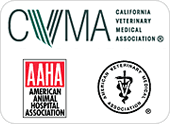To schedule an appointment with the veterinarian as soon as you acquire your new puppy is a very important part of preventive medicine. Most of congenital diseases may be diagnosed and can often be managed or corrected. Another key element to a preventive medicine is a vaccination program. The puppy vaccines will protect against many contagious diseases. The following are canine preventable diseases and can be controlled by immunization:
- Rabies – A fatal viral infection affecting the central nervous system in all mammals, including people. The virus is transmitted primarily by the saliva of an infected animal through the bite.
- Distemper – This virus affects the respiratory, digestive, and nervous systems. Often fatal, Distemper can cause vomiting. diarrhea, pneumonia and severe brain damage.
- Hepatitis – A viral disease which may lead to severe liver damage.
- Leptospirosis – A bacterial infection that often causes a potentially fatal kidney disease.
- Parvovirus – This serious viral infection causing severe vomiting, diarrhea, and potentially fatal.
- Coronavirus – Viral intestinal disease. Asymptomatic form can lead to severe damage and secondary infections. Clinical form may cause vomiting and diarrhea.
- Bordetella – The most common respiratory infection in the dog that cause bronchitis, nasal discharge, bronchopneumonia and flu-like illness.
- Lime Disease – This bacterial infection transmitted by ticks, causing high fever, arthritis, and lameness.
We recommend starting a vaccination program from 6 to 8 weeks of age. The Rabies vaccine is provided when the puppy is 12 weeks of age. After the initial vaccination program, yearly boosters are required to protect your dog from these dangerous diseases. It is important to have the puppy’s stool checked for worms.




